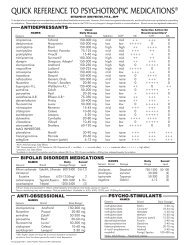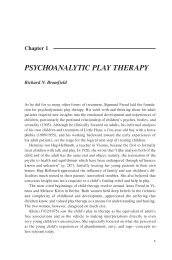IRAQ WAR CLINICIAN GUIDE
Iraq War Clinician's Guide - Network Of Care
Iraq War Clinician's Guide - Network Of Care
You also want an ePaper? Increase the reach of your titles
YUMPU automatically turns print PDFs into web optimized ePapers that Google loves.
Iraq War Clinician Guide 191 Appendix I<br />
danger ("hypervigilance"); being startled easily, for example, when hearing a loud noise<br />
("exaggerated startle response"); and anxiety andpanic.<br />
Shutting down: Emotionalnumbing. When overwhelmed by strong emotions, the body and mind<br />
sometimes react by shutting down and becoming numb. The veteran may, as a result, have<br />
difficulty in experiencing loving feelings or feeling some emotions, especially when upset by<br />
traumatic memories. Like many of the other reactions to trauma, this emotional numbing reaction<br />
is not something the veteran is doing on purpose.<br />
Active avoidance of trauma-related thoughts and feelings. Painful memories and physical<br />
sensations of fear and activation can be frightening, so it is only natural to try and find ways to<br />
prevent them from happening. One way that most veterans try is to avoid anything - people,<br />
places, conversations, thoughts, emotions and feelings, physical sensations - that might act as a<br />
reminder of the trauma. This can be very helpful if it is used once in a while (e.g., avoiding<br />
upsetting news or television programs). But when it is used too much it can have two big negative<br />
effects. First, avoidance can reduce veterans' abilities to live their lives and enjoy themselves,<br />
because they can become isolated and limited in where they can go and what they can do.<br />
Second, avoiding thinking and feeling emotions connected with the trauma may reduce veterans'<br />
abilities to recover from it. It is through thinking about what happened, and particularly through<br />
talking about it with trusted others, that survivors may best deal with what has happened. By<br />
constantly avoiding thoughts, feelings, and discussions about the trauma, this potentially helpful<br />
process can be short-circuited.<br />
Depression. Most persons who have been traumatized experience depression. Feelings of<br />
depression then lead a person to think very negatively and feel hopeless. There is a sense of having<br />
lost things: one's previous self ("I'm not the same person I was"), sense of optimism and hope, selfesteem,<br />
and self-confidence. With time, and sometimes with the help of counseling, the trauma<br />
survivor can regain self-esteem, self-confidence, and hope. It is important to let others know about<br />
feelings of depression, and of course about any suicidal thoughts and feelings that are sometimes<br />
part of feeling depressed.<br />
Self-blame, guilt, andshame. Many veterans, in trying to make sense of their traumatic war<br />
experiences, blame themselves or feel guilty in some way. They may feel bad about some thin@<br />
they did or didn't do in the war zone. Feelings of guilt or self-blame cause much distress, and can<br />
prevent a person from reaching out for help. Therefore, even thought it is hard, it is very important<br />
to talk about guilt feelings with a counselor or doctor.<br />
Interpersonal effects. The many changes noted above can affect relationships with other people.<br />
Trauma may cause difficulties between a veteran and his or her partner, family, friends, or coworkers.<br />
The veteran who is experiencing high levels of irritability and anger may now have more<br />
conflicts with others and handle them less well. Particularly in close relationships, the emotional<br />
numbing and feelings of disconnection from others that are common after traumatic events may<br />
create distress and drive a wedge between the survivor and his or her family or close friends.<br />
Avoidance of different kinds of social activities by the survivor may frustrate family members.<br />
Sometimes, this avoidance results in social isolation that hurts relationships. Some kinds of<br />
traumatic experiences (e.g., sexual assault) can make it hard to trust other people. Friends and<br />
family may respond in ways that worsen the problem rather than help recovery. They may have<br />
difficulty understanding, become angry with the veteran, communicate poorly, andlor fail to<br />
provide support.<br />
,.,. <br />
DEPARTMENT OF VETERANS AFFAIRS<br />
NATIONAL CENTER FOR PTSD




